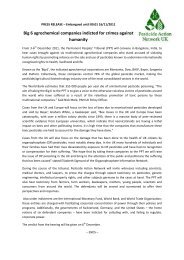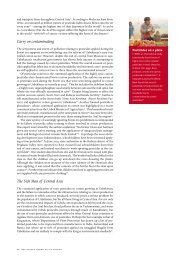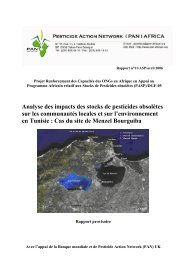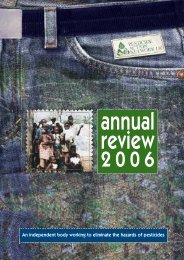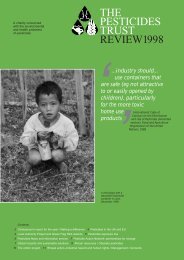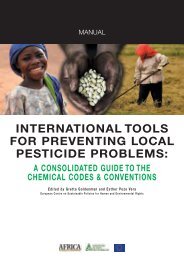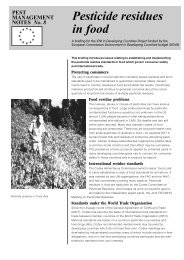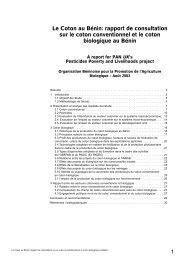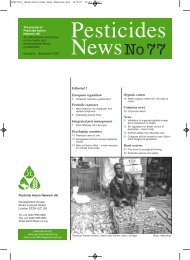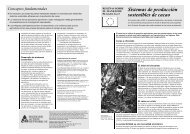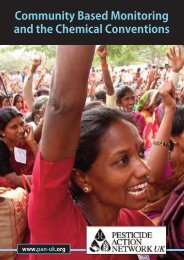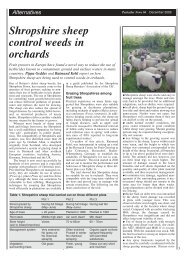Tanzania Multi Stakeholder Map - WebNG
Tanzania Multi Stakeholder Map - WebNG
Tanzania Multi Stakeholder Map - WebNG
Create successful ePaper yourself
Turn your PDF publications into a flip-book with our unique Google optimized e-Paper software.
decision to prohibit transboundary movements of HZW destined for disposal from<br />
developed countries referred to as Annex VII countries (OECD countries,<br />
European Community and Liechtenstain) to developing countries. In 1998,<br />
Parties adopted a decision to amend Annex I of the Convention by breaking it<br />
into Annex VIII (list of HZW and Annex IX (list B of non-HZW).<br />
Bamako Convention is a regional agreement for Africa, which aims at addressing<br />
inadequacies of the Basel Convention especially prohibition of transboundary<br />
movement of HZW and other waste to developing countries. Bamako Convention<br />
was adopted in January 1991 in Bamako, Mali. It came into force in 1998.<br />
Objectives of the Bamako Convention are to ban the importation of HZW and<br />
other wastes into Africa, minimize generation of HZW in terms of both quantity<br />
and hazard potential, treatment and disposal of HZW as close as possible to their<br />
source of generation in an environmental sound manner and ensure movement<br />
of HZW and their disposal are carried out in an environmentally safe Manner<br />
(ESM).<br />
The presenter highlighted possible synergies that can be promoted through<br />
collaboration between key stakeholders, national focal points, Designated<br />
National Authorities, setting up of national multi stakeholders committees on<br />
chemicals and chemical wastes, review institutional arrangements, infrastructure<br />
and human resources, involve all stakeholders to increase awareness, develop<br />
the best mechanisms for domestication through review/ promulgation /<br />
harmonization / amendment of legislation. Institutions and sectors involved in<br />
implementation of Basel and Bamako Conventions are VPO (DoE), NEMC,<br />
UDSM (BICO- linkage institute), UCLAS, MoH, CPCT, MIT, MAFS, GCLA, PO-<br />
RALG (Urban and Local authorities) and NGOs.<br />
In an effort to implement the Basel Convention several policies have been<br />
developed; these policies include the National Environmental policy (1997), the<br />
Sustainable Industrial Development Policy (1997), Mineral Policy (1997) Water<br />
Policy (2003) and Energy Policy (2002), Health Policy (1990) (currently under<br />
review) and Human Settlement Policy (2000). All new legislation incorporate<br />
provisions for the implementation of the Convention. Such legislation include the<br />
Environmental Management Act of 2004; The Industrial and Consumer<br />
chemicals (management & control) Act 2003; The Occupational Health and<br />
Safety Act, 2002; The Plant Protection Act 1997 and regulations of 1999.<br />
Initiatives to promote adoption of cleaner production have benefited 69 industries<br />
in <strong>Tanzania</strong>. Assessments to determine feasibility of using cement kilns for<br />
disposing HZW have been undertaken. National inventory of obsolete pesticides<br />
and veterinary waste was carried in 1997 and 1998.<br />
Mr Mangalili highlighted the following challenges: majority of government and<br />
political leaders, customs officers, industrialists, chemical store-keepers,<br />
agricultural extension workers and community at large are unaware of<br />
12





